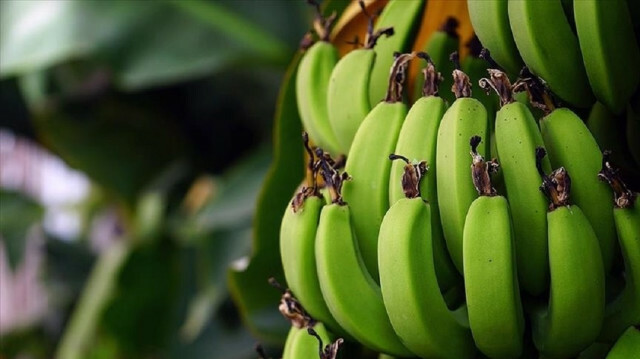
Rebecca is the happiest she’s ever been in her 10 years of marriage. Her husband Bright Nezomba has bought her another gleaming car, and the couple just renovated their home in Honde Valley in eastern Zimbabwe.
With his innovative farming practices and changing techniques, Nezomba has been named one of Zimbabwe's top banana farmers. Last year, his value-added idea, which combined bananas to make flour and banana plant trunks (stems) to manufacture fiber, was chosen second best in the country, winning him a $15,000 prize.
He has risen to become one of the country's top fruit farmers, making a name for himself and his family in the valley situated in the Manicaland province.
Speaking to Anadolu Agency, he said banana farming, which he began in 2008, has helped him reshape his life over time. "I was able to marry and pay for marriage expenses, pay for my wife's education costs, renovate our home, and buy the cars we have thanks to banana farming."
He paid for his own professional education at the Kushinga Phikelela Vocational Training Institute, where he earned a diploma in commercial farming.
The farmer has not only shone, but he has also changed the lives of many others. He went on to start Nezox Investments, which processes bananas and serves as a beacon in the valley for many small-scale farmers and rural-based enterprises looking to reduce urbanization and create employment.
"My banana project has so far employed over 20 people," he said. Despite operating in a rural area, he claimed to earn more than $700 per month from farming, enough to live a decent life.
His village business now offers products such as banana flour and ripe dried livestock feed made from banana leaves.
- Imparting banana-farming skills
The US government backed the Zimbabwe Agricultural Income and Employment Development (Zim-AIED) initiative in 2010, which worked with banana growers in the valley to improve agricultural techniques, market access, and the production of high-quality bananas.
Many banana farmers, such as Nezomba and Talent Mareya, another valley local, are now achieving dizzying heights of success.
Banana cultivation has transformed from a subsistence crop to a commercial enterprise in Zimbabwe, thanks to the diversification efforts of many banana growers like Nezomba.
Even the UN’s Food and Agriculture Organization (FAO) has for years stepped in to support banana farmers, implementing the Mupangwa Irrigation Scheme in the Honde Valley to help them improve cultivation and connect them to markets and other farmers across the region.
With skills gained from organizations such as the FAO, banana farmers have been able to pass on their expertise to neighbors and others in their communities.
The Honde Valley is now home to over 5,000 commercial banana farmers, each of whom earns an average of approximately $4,200 per acre each year, according to the FAO.
- Changing lives
Even though the country's economy is near the point of collapse, with hundreds of businesses closing owing to the hostile economy, banana farmers like him, on the other hand, are making significant economic progress by starting banana-processing businesses in their communities.
He is not the only one who has achieved success through banana cultivation, as numerous others, including Mareya, 30, have done so as well.
Mareya, a married father of five, also said he earns a good living from farming.
"Through banana farming, I make between $200 and $300 each month, and I’ve always been able to support my family and all of my employees, including my two permanent employees and several others who I hire on a temporary basis," Mareya told Anadolu Agency.
- Hurdles
Nevertheless, many farmers' successes have not come easy. "Fertilizer shortages, fluctuating prices, and, in particular, coronavirus have had a negative impact on my business," Mareya explained.
"The volume of products sold has been affected by COVID-19, since people are now selecting for basic commodities. So the demand for healthy foods made from bananas has fallen, and transportation of these products has become extremely expensive during the lockdown," Nezomba explained.
However, more farmers have switched to banana farming, transforming their lives for the better in the process.
According to Zimbabwe’s Agriculture Ministry, more than 5,000 farmers in the valley grow bananas on 2,000 hectares of land, with yields ranging from four to 20 tons per hectare.













